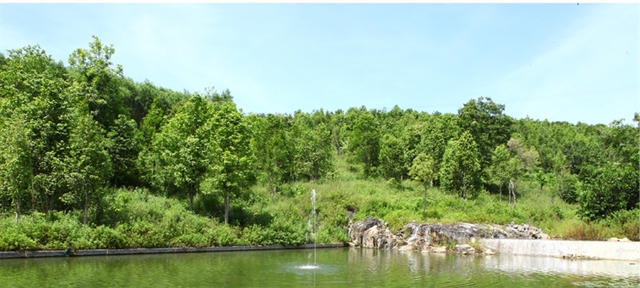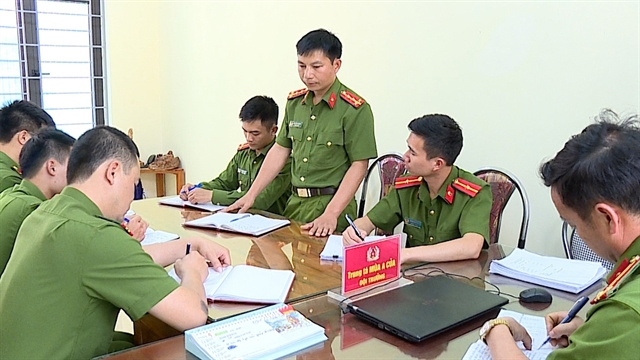 Sunday/Weekend
Sunday/Weekend


|
| Police officer, Captain Cà Văn Nghĩa (standing) is speaking at a meeting with his teamates at the Vân Hồ Police Office in Sơn La Province. — VNA/VNS Photo Nguyễn Cườn |
Police Captain Cà Văn Nghĩa in the northern mountainous province of Sơn La’s Vân Hồ District has earned a reputation as the nemesis of local criminals, especially drug smugglers.
With his outstanding record in fighting crime, the captain has set a fine example in a provincial movement called Vì an ninh Tổ quốc (For Homeland Security) in the 2015-2020 period.
Always on the front lines in tackling drug crime, Captain Nghĩa has received a host of awards from the Ministry of Public Security, the State and the Government, including a Third-Class Victory Medal in 2016 and a Certificate of Merit in 2019.
He said these awards encourage him to redouble his efforts as a police officer and be more active in fighting all types of crime.
Some 300km west of Hà Nội, Sơn La is notorious as a drug hot spot, with a thousand or so cases a year involving the seizure of hundreds of kilograms of narcotics.
“Vân Hồ District is a crime hot pot in Sơn La, especially drug smuggling,” Nghĩa said.
“Because of economic difficulties, local people are easily bribed to become cogs in drug-dealing networks. They are attracted by the substantial sums to be made and blindly do whatever drug dealers tell them to do. They don’t understand that their lives and the lives of others can be destroyed in just one day.”
Smugglers use every means at their disposal to transport and trade narcotics, with large quantities coming through areas with rough and tough geographic conditions, like jungles and rivers.
“The money to be made makes these criminals reckless, and when they are discovered and the police close in they are too quick to use weapons, even guns, as they attempt to escape,” Nghĩa explained.

|
| Captain Nghĩa (with book in hands) at a meeting with his colleagues. — VNA/VNS Photo Nguyễn Cường |
Under the robust direction of provincial and district police, from 2015 to 2019 Nghĩa and his colleagues in the Vân Hồ District anti-drug smuggling force uncovered 457 drug crime cases, arrested 725 criminals, and seized 120kg of heroin, more than 100,000 synthetic drug tablets, and a variety of weapons, including nine guns and 159 bullets.
Their achievements in fighting drug crime have made a major contribution to maintaining political and social security in the area.
A typical case in the fight against drug crime Capt Nghĩa remembers well occurred in the early hours of April 17, 2019 in Lóng Luông Village, Lóng Luông Commune.
He and his fellow officers successfully broke up a large drug smuggling network and arrested its mastermind -- Giàng A Cấu, a local man aged 37. Cấu was arrested while transporting a large amount of drugs, including 20 bars of heroin and 198 methamphetamine tablets, while police also seized drug paraphernalia and a motorbike.
Drug busts like this depend very much on the bravery and determination of the police, according to Nghĩa.
“To discover and arrest criminals, the police officers must adopt a strong political stance, be proficient in their professional skills, have a solid grasp of the law, and, especially, follow orders from superiors,” he said.
“They should always be enthusiastic and go about the job with wisdom and courage."
Nghĩa went on: "Officers should also focus on securing the trust of the public, particularly in the local community, as their support is crucial in fighting crime, and on helping them understand the importance of protecting national security and encouraging them to play their part.
“The police need to get the public involved in combating crime in their local area, because sometimes they provide valuable information.”
Many of his successful cases resulted from solid police work and thorough investigations, and it’s also important to know the geographical conditions where crimes are taking place and learn what you can about the criminals you’re chasing after, including their life and character.
“To be successful in closing down a drug network, a police officer must establish a plan, receive advice from his superiors, and mobilise support from local people and authorities,” Nghĩa explained. “He or she must also ensure the absolute safety of their fellow officers as well as the community and people who support them.”
Lt Col Mùa A Của, leader of the police investigation team on criminal/economic/drug crime with Vân Hồ District Police, praised Nghĩa as a shining example for local police officers to follow.
“Nghĩa is never afraid of hardship and has proven to be brave in every case he’s been involved in,” he said. “He is always at the forefront in taking on criminals.”
The man himself has found that the key to success in anti-drug campaigns is to limit the involvement of local people in the crime, so he works on programmes to raise awareness about the State’s laws.
He also tries to understand local people’s needs and what their general attitude is, so he and his superiors can adopt appropriate policies on fighting crime, particularly drug-related crime.
A resident of Pa Chè Village in Vân Hồ District, Mùa A Sềnh, said many local people didn’t really understand the danger of using drugs in the past and ended up becoming addicts.
They would often use drugs together in groups, but since Capt Nghĩa started talking to them about the harmfulness of drug addiction, many vowed to go clean and live an honest life, according to Sềnh.
“Since Nghĩa began coming to our village, drug crime and theft are much less common and local people feel safer than they did before,” he said.
Sơn La Province, especially the districts of Mộc Châu and Vân Hồ, has become an entry point in recent years for illegal drugs trafficked from Laos to Việt Nam.
To fight drug criminals, especially armed traffickers, the Border Guard High Command, the police, and other forces in the neighbouring province of Điện Biên as well as Lao police have strengthened their cooperation in the implementation of large-scale anti-drug campaigns.
Investigations have been carried out and officers mobilised, which raises awareness among local officials and people in border areas about preventing and fighting drug crime and also cements the grassroots political system.
The fight against drugs has seen positive outcomes and coordination between local border guards and the police has become closer and more effective. VNS




